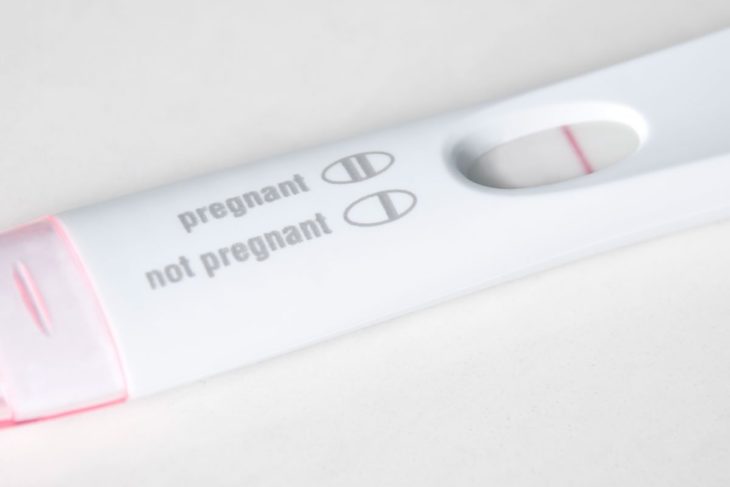It was a Tuesday afternoon and I was on my therapist’s couch. I described for her an incident over the weekend when I felt sad, deeply sad, for seemingly no reason at all. I had felt reclusive and shy and wanted to stay in my bed; when my husband encouraged me to go to a birthday party that night that I actually wanted to go to, I had started crying. I’m a sensitive person, sure, but even while I was crying I knew my tears didn’t make much sense.
I shared some other strange behavior changes lately. I’ve been more hungry than usual, more often and ravenously so. I get snappish when I can’t eat immediately (hangry, I believe, is the technical term). I’m usually pretty easygoing, but lately I’d been having random mood swings. I was beginning to feel embarrassed about my behavior.
“You’re emotional … your appetite has changed …,” she paused. “Have you considered that you might be pregnant?”
I ran the possibility by my husband a night or two later. It’s a conversation familiar to heterosexual, fertile couples everywhere: “It’s probably nothing, I just think I should check, I’m sure this isn’t it … but, um, I think I’m going to take a pregnancy test just to be sure.”
“You’re not pregnant, you’re on the Pill!” He responded. But the Pill is not 100 percent effective. Even though I faithfully swallow it every night when I remove my contact lenses, I know accidents happen. Still, my husband reassured me, “It’s probably just normal emotional stuff. You’re just having all the feelings right now.” He could be right, I told myself. This winter has had relentless snowstorms and chilly, overcast days, just weeks upon weeks without much sunlight. Maybe I’m just feeling depressed again? I reasoned. So I put the idea of taking a pregnancy test in the back of my mind.

Source: Babyology
Another week passed. Feeling all the feelings got harder to ignore. I got in an argument with my mom and began sobbing near-hysterically — a gasping-for-breaths cry sesh that might have been more appropriate if someone had just died. Then my husband and I were about to cook dinner one night and the clutter on the kitchen counters made me go batshit. I do have more than a few OCD tendencies towards cleanliness. But how upset I felt was way out of proportion with the annoyance of removing the (tiny) fruit sticker someone had lazily stuck to our counter instead of throwing in the trash.
So, I decided to take a pregnancy test. My main reason was mostly to see if pregnancy hormones had something to do with my feelings. But another important reason to find out whether I was pregnant, of course, was to do something about it. I feel unsure about becoming at mom at all, but my husband and I aren’t in an ideal place to have a child at this point in time as well. Some day, maybe in a few years? Probably. But I couldn’t — like my parents did with my unexpected appearance in my mom’s uterus — see a it as a “happy surprise.” I already knew if I was pregnant, I would have an abortion.
Once I decided just to pee on a stick already, I hurried to a CVS pharmacy during lunch. I grabbed an e.p.t. (one of the least expensive tests which still come two-to-a-package). I could have — maybe should have — waited until I got home that night, but I wanted an answer as soon as I could have one. So, I tucked myself into a bathroom stall in my office, hovered the stick over the toilet bowl, and peed on it.
Very quickly, the minus sign appeared: “not pregnant.” Whew, I thought to myself. Then I tried to figure out whether it was appropriate to dispose of the pregnancy test in the little tiny box in the bathroom stall where the used sanitary napkins go, or whether I should wrap toilet paper around it and toss it in the trash.
Upon learning my uterus was blessedly empty, I assumed I would feel instantaneous relief wash over me. I have taken a few pregnancy tests in my life, usually when something wonky was going on with my menstruation cycle (and once to doubly-confirm I wasn’t pregnant after I had unprotected sex and took Plan B). That kind of not-pregnant relief is of the Thaaaaank Goddddd variety that you text your girl friends about. But it was difficult to feel excited: instead, I mostly felt annoyed that my answer to one question (Am I pregnant?) was still a non-answer for the bigger problem I’d been trying to solve (Why am I so emotional and cranky and hungry lately?). I could rule out pregnancy as an obvious reason for my wonky behavior — one with an easy resolution — but not being pregnant meant I still had detective work to do about my all-over-the-place emotions.. I tossed the pee-covered pregnancy test in the trash and went back to my desk.

Source: Twitter
The relief that I wasn’t pregnant didn’t feel the way that I had expected. This relief felt different; this relief was wrapped up in guilt. It had been very, very easy for me to plan in my mind what I’d do and how I’d do it if I had an unwanted pregnancy. I would have had my husband’s complete support. All we would have to do would be to operationalize it: make an appointment, take a day off work, get the money and health insurance together to pay for it. I could visualize and execute the steps on how to handle an unhappy surprise.
Moreso than ever before, I was aware of how what I had just gone through — confusing and worrisome as it may have been — was very privileged.
I live in New York City, a state where access to contraception and abortion is some of the best in the country. Elsewhere in America, 87 percent of counties have no abortion provider and in rural areas, that number climbs to 97 percent. But it would have been easy to make appointment for an abortion — or even repeat appointments if I were forced by state law to adhere to a “waiting period” (despite the fact my mind was already made up). I could easily travel there by subway or bus or taxi. There would be certainly anti-abortion protesters outside the more well-known clinics, even in our fairly liberal city, but it wouldn’t be anything like the lying-down-on-the-sidewalk-impeding-the-entrance bullshit that patients and clinic employees have to deal with elsewhere. I can handle being screamed at by strangers about going to hell.
As a white woman, I would not have to think even once about how my decision could be interpreted as a reflection on the population growth of my entire race. A middle-class white woman like me wouldn’t be questioned in quite the same way as to how or why she accidentally got pregnant. It would more than likely be assumed that my “unhappy surprise” was really an accident because, as a white person, I am seen as “responsible.” No one would tell me, if I sought an abortion, that I was participating in racial genocide. My womb is not politicized quite in the same way.
Somehow, I would be able to pay for an abortion — though, like many women, that would have been the biggest hardship for me. But it wouldn’t be too great a hardship, because as a middle-class person, I have access to money (even if it’s not my own). I could figure something out if my health insurance would not cover it.
I could get off work without being penalized or fired; if my bosses somehow found out I’d terminated a pregnancy, they wouldn’t and couldn’t terminate my job just because it didn’t match up with their own “personal values.” As a professional woman, it would mostly be assumed that, if I took a day off work for a “health emergency,” I was telling the truth. My job would be waiting for me when I got back.

Source: healthywomen.org
If, for whatever reason, my husband couldn’t be around during or afterward, I have siblings I am close to and girl friends who would support me. If I told my mom and dad (because as an adult, they are not required to be notified or give permission for what I do with my womb), I’m pretty sure they wouldn’t be happy about it. But I also know they truly love me unconditionally. My parents wouldn’t excommunicate me and my husband or throw us out of the family for making that choice. My own spiritual beliefs, and those of the people I’m close to, wouldn’t dictate how we plan our family. I may feel sad about having the procedure (especially given my wonky depressed emotions already), but I would not feel the need to apologize for it.
In short, having an abortion would have been what it is meant to be: just another aspect of women’s reproductive health care. This is a privilege that I’ve always been conscious of; I am, obviously, a strong supporter of reproductive justice and a woman’s right to make choices over her own body. It’s not a privilege that I experienced or truly felt, though, until I had to think about it impacting my life.
It shouldn’t be this way, of course. I guess you could say it is humbling: There is nothing that I have done, other than be born middle-class and white to two educated, moderate Republicans in Connecticut, that makes me special. My ability to make decisions about my body shouldn’t have to do with where my husband and I live, my age, the color of my skin, or how much money is in my checking account. This experience has given me a renewed vigor to protect all women’s right (and the right of those with uteruses who do not identify as women) to access abortion as easily as I could.
Original by Jessica Wakeman
